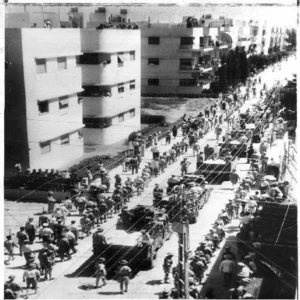The History of Tel Aviv:
From Humble Beginnings to a Modern Metropolis
Tel Aviv, often referred to as “The White City,” is a bustling urban center on Israel’s Mediterranean coast. Founded just over a century ago, Tel Aviv has transformed from a small sand dune settlement into one of the most dynamic cities in the Middle East. This article traces the city’s history, highlighting key events, economic development, and its current role as a major tourist destination.
History of Tel Aviv
Tel Aviv in 1909
Early Foundations and Growth
Founding of Tel Aviv
Tel Aviv was officially founded on April 11, 1909, by a group of 66 Jewish families who gathered on the sand dunes north of Jaffa. This event, known as the “Lottery of Seashells,” involved drawing lots to allocate plots of land. The founders aimed to create a new urban area that offered better living conditions than the overcrowded and unsanitary conditions in Jaffa.
History of Tel Aviv

Growth and Development
Initially, Tel Aviv grew steadily, attracting more residents and expanding its boundaries. By the 1920s and 1930s, the city experienced significant growth due to an influx of Jewish immigrants, particularly from Europe. These immigrants were fleeing persecution and seeking new opportunities, bringing with them a wealth of cultural and intellectual capital. This period saw the establishment of many cultural institutions and the development of a vibrant urban life.
Bauhaus Architecture
One of the defining features of Tel Aviv is its Bauhaus architecture, introduced by German Jewish architects who immigrated during the 1930s. The city is home to over 4,000 Bauhaus buildings, which led to its designation as a UNESCO World Heritage Site in 2003. This architectural style, characterized by simplicity, functionality, and the use of modern materials, has become synonymous with Tel Aviv’s urban landscape.
Economic Evolution
Early Economic Activities
In its early years, Tel Aviv’s economy was primarily based on small-scale commerce and artisan trades. The establishment of the Tel Aviv Port in 1936 marked a significant economic milestone, facilitating trade and commerce independent of the Arab-dominated Jaffa Port. This development was crucial during the Arab revolt when Jewish access to Jaffa was restricted.
Post-1948 Development
After the establishment of the State of Israel in 1948, Tel Aviv continued to grow rapidly. The city became the economic and cultural heart of the new nation, attracting businesses, artists, and intellectuals. The construction of major highways and the expansion of public services further stimulated growth.
The Hi-Tech Boom
The late 20th century saw Tel Aviv emerge as a global center for technology and innovation. Often referred to as “Silicon Wadi,” the city has become a hub for startups and high-tech industries. Companies like Waze, Mobileye, and ICQ were founded in Tel Aviv, contributing to its reputation as a leading technology center. The presence of numerous venture capital firms and multinational tech companies has further solidified Tel Aviv’s status as an economic powerhouse.
Tel Aviv Today: A Tourism Hub
Cultural and Recreational Attractions
Today, Tel Aviv is not only a center for business and innovation but also a major tourist destination. Its vibrant cultural scene, featuring museums, theaters, and music venues, attracts millions of visitors each year. The Tel Aviv Museum of Art, the Eretz Israel Museum, and the Habima Theatre are just a few examples of the city’s rich cultural offerings.
Beaches and Nightlife
Tel Aviv’s Mediterranean coastline is dotted with beautiful beaches that draw both locals and tourists. Gordon Beach, Frishman Beach, and Banana Beach are popular spots for sunbathing, swimming, and water sports. The city’s nightlife is equally renowned, with a plethora of bars, clubs, and restaurants that cater to a diverse array of tastes and preferences.
Annual Events and Festivals
The city hosts numerous events and festivals throughout the year, such as the Tel Aviv Pride Parade, which is one of the largest LGBTQ+ events in the world, and the Tel Aviv International Film Festival, which attracts filmmakers and cinephiles from around the globe.
Key Historical Milestones
- 1909: Founding of Tel Aviv by 66 Jewish families.
- 1921: Tel Aviv is granted township status.
- 1934: Tel Aviv is recognized as a city.
- 1936: Opening of the Tel Aviv Port.
- 1948: Declaration of the State of Israel; Tel Aviv serves as the temporary capital.
- 1965: Tel Aviv University is established.
- 2003: Tel Aviv’s White City is designated a UNESCO World Heritage Site.
References
- “Tel Aviv – The White City,” UNESCO World Heritage Centre.
- “History of Tel Aviv,” Jewish Virtual Library.
- “The History of Tel Aviv,” Tel Aviv Global.
- “Startup City Tel Aviv,” Startup Genome.
- “Tel Aviv Beaches,” Time Out Tel Aviv.
- “Events in Tel Aviv,” Visit Tel Aviv.



